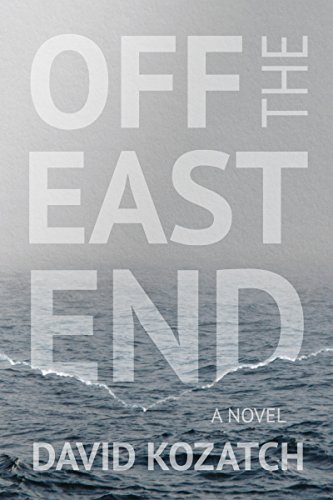

By Joan Baum
Like many stories that resonate as real, “Off the East End” contains the familiar disclaimer that it is a work of fiction and “similarities to real people, places, or events are entirely coincidental.” Still, it is difficult not to conclude that the author is eager to have readers identify certain East End personalities and locations (e.g., Bonnie Grice and her radio show “Media Mavens” here referenced as Ronnie Price’s “Media Marvels,” areas in Springs, the Shinnecock Reservation, Main Beach). Indeed, on an Acknowledgments page, the author, who is a “writer and communication consultant” in the city and in East Hampton, names local people who assisted him in critiquing and vetting early drafts of his debut novel, including folks at the Southampton Writers Conference.
Their involvement consisted also in providing or reviewing material on a variety of subjects of special significance to the East End. These include police work, the fishing and boat industry, the local press, Native Americans in Southampton, the Latino population and opposition to their growing presence, farming (legal and otherwise), Catholicism, night spots, illegal housing and the drug scene among the young. The information enriches the novel and shines a light on an un-Hampton way of life in The Hamptons, but the extent of the details and the back stories on both major and minor characters (not always easy to differentiate) tend to overwhelm. The novel is long, the main narrative veers off course, and the intended suspense about a body washed up against a jetty one early morning — that mysteriously disappears — is diffused.
[caption id="attachment_74453" align="alignright" width="317"] David Kozatch[/caption]
David Kozatch[/caption]
Covering the summer and fall of a recent but unspecified year (some time after “the five towns on the North and South Fork have officially seceded from the rest of Suffolk County”), chapters advance by way of datelines — days of the week and sometimes various times of the same day. It all begins on “Thursday on Beach Lane” with the discovery of a beautiful young woman’s body by a surfer. Inexplicably, the boy takes pictures of the girl and posts them on his website, which goes viral. But in a short matter of time, the body disappears.
It turns out that the protagonist’s adolescent son Connor has copies of the pictures, and that his father, Paul Sandis, sees them. Paul, the book’s main character, is a former New York City journalist, now East End reporter whose ex-wife is about to marry a colleague in the real-estate business. The back stories start to mount as the town, the police and various people from the community step up their investigation into the missing girl. Who was she, where did her body go, was she murdered, how did her body then turn up on a local cop’s property? And what about the markings on her breast, a star tattoo said to be related to a Latino gang?
Paul senses he has a major story in the works, one that will attract the big city media. He’s a good guy and seems to make friends easily, including a temporary hookup with his ex-wife. His new friends include an attractive woman he happens to meet on the beach, Merika, who’s from the Reservation. Sensual and intelligent woman, she exemplifies the injustice, racism and hard times faced by many on the Res, including the violence that some Native Americans turn against their own, or cannot prevent.
Kozatch has done extensive research and has spoken with all manner of locals, rich and poor, long-time residents and city transplants. Most impressive, he’s mastered the slang and syntax of teenage kids. Aimless and angry, their code conversations will prove enlightening to those of an earlier generation (say “weed,” not “pot,” which is passé), and that ring true as accounts of behavior that even the delinquent kids themselves may not see as criminal.
These are important topics, but they are not always integrated into a compelling narrative in which character and plot development reinforce one another. Chapters proceed arbitrarily, as different points of view take over that tell of disasters and dreams. Some of these stories seem irrelevant to the main action, as when Paul’s father, for example, a philosophy professor, decides to give a mini lesson on “beauty” to Merika by way of Plato and Kant.
“Off the East End” is an earnest book, and it’s obvious that the author has a commitment to the people he writes about. That his novel explores the timely and significant issues he raises more effectively than journalism is moot, but it’s commendable that he has engaged the genre.
David Kozatch will read from his novel, “Off the East End,” at Canio’s Books, 292 Main Street in Sag Harbor, on Saturday, November 11 at 5 p.m.